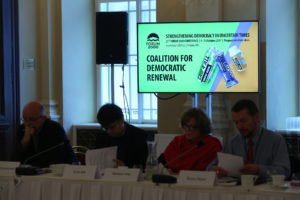
21st Forum 2000 Conference
The three pillars of freedom, protection and progress form the basis of democratic renewal, according to French President Emmanuel Macron. He proposes the establishment of a European Agency for the Protection of Democracies to provide Member States with experts to protect elections against cyberattacks and manipulation.
“In this same spirit of independence, we should also ban the funding of European political parties by foreign powers,” he adds. “We should have European rules banish all incitements to hate and violence from the Internet, since respect for the individual is the bedrock of our civilization of dignity.”
Russia has sought to undermine democracy on its Western periphery, using disinformation and similar active measures, observers suggest.
In addition, the young democracies of Central and Eastern Europe may find themselves pulled between Berlin and Moscow due to the Eastern blind spot in German leadership, analyst Iulia-Sabina Joja writes for the American Interest.
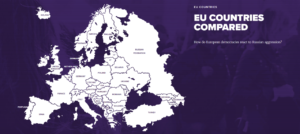
KremlinWatch
“Berlin, as the reluctant European leader, finds itself in the middle of a re-arrangement of Transatlantic relations without a clear strategy; it seems to tactically approach each security issue,” she observes. “Germany has ambitions to beef up European security in the context of the European Union, but it needs to find a way to do so that placates everyone: Republicans, ambitious French, Brexiting Brits, and increasingly dissatisfied Central and Eastern Europeans.”
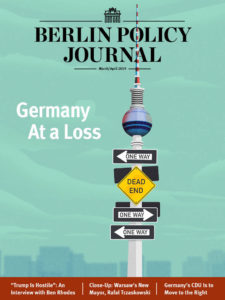 The dichotomy between models of liberal Western democracy and openness toward more integration on one side and models of illiberal democracies and societies as well as isolationist criticism of the EU on the other can no longer be reduced to a fault line between East and West, argues analyst Daniela Schwarzer.
The dichotomy between models of liberal Western democracy and openness toward more integration on one side and models of illiberal democracies and societies as well as isolationist criticism of the EU on the other can no longer be reduced to a fault line between East and West, argues analyst Daniela Schwarzer.
It is crucial to the EU’s future to be able to fend off the external influences which seek to divide it, undermine its ability to act, and weaken democracies and democratic powers, she writes in Must Do Better, an article for the Berlin Policy Journal.
The European Parliament’s largest Eurosceptic alliance is hopeful of bringing Viktor Orban into its ranks as Hungary’s prime minister faces calls for his expulsion from his conservative European political family, the FT reports:
Ryszard Legutko, co-head of the European Conservatives and Reformists group, said he hoped his expanding group could convince Mr Orban to have “second thoughts about his membership” of the European People’s party, where his Fidesz party is under fire.
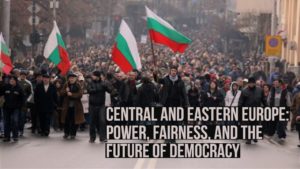 Peter Kreko, of Political Capital, a Budapest-based think-tank often critical of the government, said that expulsion of Fidesz from the EPP could entail political costs at home for Mr Orban, proving he has shifted away from the European mainstream, the FT adds.
Peter Kreko, of Political Capital, a Budapest-based think-tank often critical of the government, said that expulsion of Fidesz from the EPP could entail political costs at home for Mr Orban, proving he has shifted away from the European mainstream, the FT adds.
“A lot of the middle class and intellectuals in and around Fidesz will be very unhappy about it because it would mean the official disappearance of the centre right in Hungary,” he said, noting that Fidesz took on the trappings of the far-right in 2015 during the European migration crisis.
Beyond anti-democratic temptation
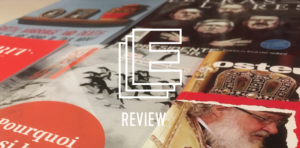
Eurozine
The comeback of ethnocentric populism is disquieting, but does not necessarily mean the end of the liberal engagement the revolutions of 1989 inaugurated, Marius Stan and Vladimir Tismaneanu write for Eurozine. It may as well be a short-lived return of repressed emotions and phobias, an effect of the disenchantment that follows almost every revolution.
Central Europe has provided a laboratory for such theoretical concerns to be proven right, analyst Miles Maftean writes for Visegrad Insight:
Illiberal democracies are using a similar militant logic against its political opponents: they oppress legitimate opposition through repressive laws on media, civil society actors and educational institutions. … In these states, such as Poland and Hungary, the techniques of militant democracy have been turned on their head, leading to what one might call a militant illiberal democracy: cracking down on anti-government protestors, taking over opposition movement governing boards, limiting media and so on.
 When authoritarian ‘illiberal’ democracies developed themselves in Belarus (after 1994) and Russia (after 2000) it was considered a systemic mistake that could only happen in less-advanced, non-EU countries, notes Ivan Mikloš, former Slovak deputy prime minister. There are many characteristics of the illiberal democracy but the most important systemic feature is threatening the rule of law, he writes for Emerging Europe.
When authoritarian ‘illiberal’ democracies developed themselves in Belarus (after 1994) and Russia (after 2000) it was considered a systemic mistake that could only happen in less-advanced, non-EU countries, notes Ivan Mikloš, former Slovak deputy prime minister. There are many characteristics of the illiberal democracy but the most important systemic feature is threatening the rule of law, he writes for Emerging Europe.
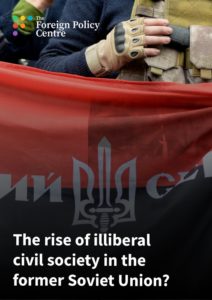 The European Union and the United States devote considerable funds and programs to supporting civil society in Eastern Europe and the Western Balkans – support confronted with old and new challenges, notes a new analysis from the German Marshall Fund. Closing civic space is now entrenched in many countries and the means to undermine civic actors has become more sophisticated. The sustainability of civil society organizations (CSOs) remains a challenge. This requires the EU and the United States to work with and alongside each other more efficiently to make sure that funds are used in the most impactful way.
The European Union and the United States devote considerable funds and programs to supporting civil society in Eastern Europe and the Western Balkans – support confronted with old and new challenges, notes a new analysis from the German Marshall Fund. Closing civic space is now entrenched in many countries and the means to undermine civic actors has become more sophisticated. The sustainability of civil society organizations (CSOs) remains a challenge. This requires the EU and the United States to work with and alongside each other more efficiently to make sure that funds are used in the most impactful way.
*Partners of the National Endowment for Democracy.







